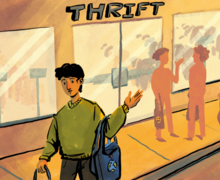Shields: Sexual consent app idea has good intentions, needs improvements
Less than two weeks after launching, Good2Go, the app that attempted to tackle the issue of consent by having its users explicitly consent to sex, shut down, according to a Tuesday Slate article. Apple pulled it from the App Store, stating that, according to its developer’s guidelines, the app displayed “objectionable or crude content.”
Although this app had good intentions, it was highly problematic and would not have been an effective contribution to the fight against rape and sexual assault. If an app similar to Good2Go is going to return to the App Store, it needs to make some changes.
The Good2Go app gained national attention when it launched around the same time the state of California passed the “Yes Means Yes Law” on Sept. 28. The law highlights the idea of affirmative consent, and the app was trying to do the same.
Lee Ann Allman, the creator of Good2Go, told Slate in Sept. 29 article that she was inspired to make the app after having a conversation about sexual assault with her college-aged children. She wanted to provide a source of guidance for young adults, like her own children, who are aware of the frequency of sexual assault on college campuses, but unsure of what to do about it. After having her app pulled from the App Store, Allman has also pulled it from Google Play and shut down her website; she plans on re-launching it in the future, but as an educational tool, according to the Slate article.
The main problem with the Good2Go app was that it only asked if someone was “Good2Go.” The app did not address which sexual acts a partner consented to and which ones he or she did not. Though it may seem vulgar to some, and also impractical, if this app truly was advocating for recorded consent, it would have made sense for it to ask for consent every step of the way. The original setup of the app limited a user’s option to change his or her mind. If users were “Good2Go,” but later decided they weren’t, the record would not be in their favor.
In the Sept. 29 interview with Slate, Allman said “But it does create a data point that there was an occasion where one party asked the other for affirmative consent, that could be useful in the future … there are cases, of course, as we know, where the accused is an innocent party, so in that case, it could be beneficial to him.”
Access to this information would be great for those who are falsely accused of rape, but even Good2Go acknowledged that consent could be given and then later revoked.
The app also didn’t seem to take into account the fact that a person could simply fill out the survey for his or her partner. In these instances, the Good2Go app would have said there was consent even if a rape had occurred. It’s not the most reliable witness.
I applaud Allman for her efforts to promote affirmative consent, but this app would have been a problematic addition to this cause.
Allman seems to have learned from this setback, opting to re-launch Good2Go as an educational tool that calls attention to consent and rape instead of treating the app as a contract.
But if there are any copycats of Good2Go, hopefully the app will better address the multi-faceted nature of affirmative consent.
Mandisa Shields is a sophomore newspaper and online journalism major. Her column appears weekly. She can be reached at meshield@syr.edu and followed on Twitter @mandisashields.
Published on October 9, 2014 at 12:01 am





